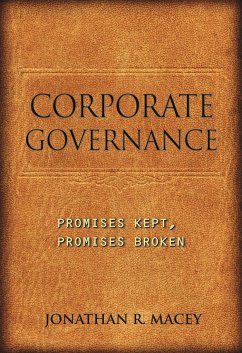Even in the wake of the biggest financial crash of the postwar era, the United States continues to rely on Securities and Exchange Commission oversight and the Sarbanes-Oxley Act, which set tougher rules for boards, management, and public accounting firms to protect the interests of shareholders. Such reliance is badly misplaced. In Corporate Governance, Jonathan Macey argues that less government regulation--not more--is what's needed to ensure that managers of public companies keep their promises to investors.
"A refreshing look at corporate governance that resonates in the real world. For example, Macey argues that so-called 'independent' directors are not really as independent as they appear and explains why the handpicked members of the boards of directors of publicly held companies often are more attentive to managers' interests than to shareholders' interests. Macey points out that there is something wrong with a corporate-governance system that regularly allows ostensibly independent corporate directors to refuse to permit shareholders to decide for themselves when to sell their own companies. Macey does an excellent job of explaining the legal and political problems that give too much power to incumbent managers and not enough to shareholders and free markets."--Carl Icahn "Macey's book is must reading for any serious student of corporate governance. He brings his usual keen analyses and fresh insights to a field where unexamined received wisdom and advocacy of me-too 'best practices' have too often been the norm."--John F. Olson, senior partner at Gibson, Dunn & Crutcher LLP "The ambition and achievement of this work is dazzling. Macey leaves no stone unturned in his penetrating examination of the system of American corporate governance. The book will doubtless be an important contribution to the longstanding debate over how best to support the bedrock role that the public corporation plays in the American economy."--Ronald J. Daniels, University of Pennsylvania "Intriguing, provocative, and readable. One comes away from this book with a good sense of why the institutions of corporate governance are not always what they seem, and why politics plays too large a role in the choice of what to embrace and what to shun. The existing literature on corporate governance is enriched by this book."--Donald C. Langevoort, Georgetown University "This book is important, interesting, and argumentative. It is wonderfully useful for bringing us up to date with how theory applies to an important set of issues and what those issues say about theory. Corporate Governance will be valuable to many readers, from faculty to students, from journalists to directors, from those who like the system we have to those who are critical of it, and from those who agree with the author and those who don't!"--Peter A. Gourevitch, coauthor of Political Power and Corporate Control
"A refreshing look at corporate governance that resonates in the real world. For example, Macey argues that so-called 'independent' directors are not really as independent as they appear and explains why the handpicked members of the boards of directors of publicly held companies often are more attentive to managers' interests than to shareholders' interests. Macey points out that there is something wrong with a corporate-governance system that regularly allows ostensibly independent corporate directors to refuse to permit shareholders to decide for themselves when to sell their own companies. Macey does an excellent job of explaining the legal and political problems that give too much power to incumbent managers and not enough to shareholders and free markets."--Carl Icahn "Macey's book is must reading for any serious student of corporate governance. He brings his usual keen analyses and fresh insights to a field where unexamined received wisdom and advocacy of me-too 'best practices' have too often been the norm."--John F. Olson, senior partner at Gibson, Dunn & Crutcher LLP "The ambition and achievement of this work is dazzling. Macey leaves no stone unturned in his penetrating examination of the system of American corporate governance. The book will doubtless be an important contribution to the longstanding debate over how best to support the bedrock role that the public corporation plays in the American economy."--Ronald J. Daniels, University of Pennsylvania "Intriguing, provocative, and readable. One comes away from this book with a good sense of why the institutions of corporate governance are not always what they seem, and why politics plays too large a role in the choice of what to embrace and what to shun. The existing literature on corporate governance is enriched by this book."--Donald C. Langevoort, Georgetown University "This book is important, interesting, and argumentative. It is wonderfully useful for bringing us up to date with how theory applies to an important set of issues and what those issues say about theory. Corporate Governance will be valuable to many readers, from faculty to students, from journalists to directors, from those who like the system we have to those who are critical of it, and from those who agree with the author and those who don't!"--Peter A. Gourevitch, coauthor of Political Power and Corporate Control








